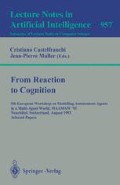Abstract
Because we think that plans or strategies are useful for coordinating multiple agents, and because we hypothesise that most of the plans we use are build partly by us and partly by our immediate environment (which includes other agents), this paper is devoted to the conditions in which strategies can be viewed as the result of interactions between simple agents, each of them having only local information about the state of the world. Our approach is based on the study of some examples of reactive agents applications. Their features are briefly described and we underline, in each of them, what we call the emergent strategies obtained from the local interactions between the agents. Three examples are studied this way: the eco-problem-solving implementations of Pengi and the N-Puzzle, and the sociogenesis process occurring in the artificial ant colonies that compose the MANTA project. We then consider a typical strategical game (chess), and see how to decompose it through a distributed reactive approach called MARCH. Some characteristics of the game are analysed and we conclude on the necessity to handle both a global strategy and local tactics in order to obtain a decently strong chess program.
Preview
Unable to display preview. Download preview PDF.
Bibliography
R. Brooks, “Planning is just a way of avoiding figuring out what to do next”, MIT Working Paper 303,1987.
C. Delaye, J. Ferber & E. Jacopin “An interactive approach to problem solving” in Proceedings of ORSTOM'90, November 1990.
A. Drogoul, J. Ferber, E. Jacopin “Viewing Cognitive Modeling as Eco-Problem-Solving: the Pengi Experience”, LAFORIA Technical Report, n∘ 2/91
A. Drogoul & J. Ferber, “Multi-Agent Simulation as a Tool for Modeling Societies: Application to Social Differentiation in Ant Colonies”, in Proceedings of MAAMAW '92 (forthcoming “Decentralized AI IV”).
A. Drogoul, J. Ferber, B. Corbara, D. Fresneau, “A Behavioral Simulation Model for the Study of Emergent Social Structures” in Towards a Practive of Autonomous Systems, F.J. Varela & P. Bourgine Eds, pp. 161–170, MIT Press.
A. Drogoul & C. Dubreuil “Eco-Problem-Solving model: Results of the N-Puzzle”, in (Werner & Demazeau 1992), pp 283–295.
A. Drogoul & C. Dubreuil “A Distributed Approach to N-Puzzle Solving”, to appear in the proceedings of the 13th DAI Workshop.
J. Ferber & A. Drogoul, “Using Reactive Multi-Agent Systems in Simulation and Problem Solving”, in “Distributed Artificial Intelligence: Theory and Praxis”, L. Gasser eds.
P. Wavish “Exploiting Emergent Behaviour in Multi-Agent Systems” in (Werner & Demazeau 1992).
E. Werner & Y.Demazeau, “Decentralized AI 3”, North-Holland, June 1992.
Author information
Authors and Affiliations
Editor information
Rights and permissions
Copyright information
© 1995 Springer-Verlag Berlin Heidelberg
About this paper
Cite this paper
Drogoul, A. (1995). When ants play chess (Or can strategies emerge from tactical behaviours?). In: Castelfranchi, C., Müller, JP. (eds) From Reaction to Cognition. MAAMAW 1993. Lecture Notes in Computer Science, vol 957. Springer, Berlin, Heidelberg. https://doi.org/10.1007/BFb0027053
Download citation
DOI: https://doi.org/10.1007/BFb0027053
Published:
Publisher Name: Springer, Berlin, Heidelberg
Print ISBN: 978-3-540-60155-5
Online ISBN: 978-3-540-49532-1
eBook Packages: Springer Book Archive

